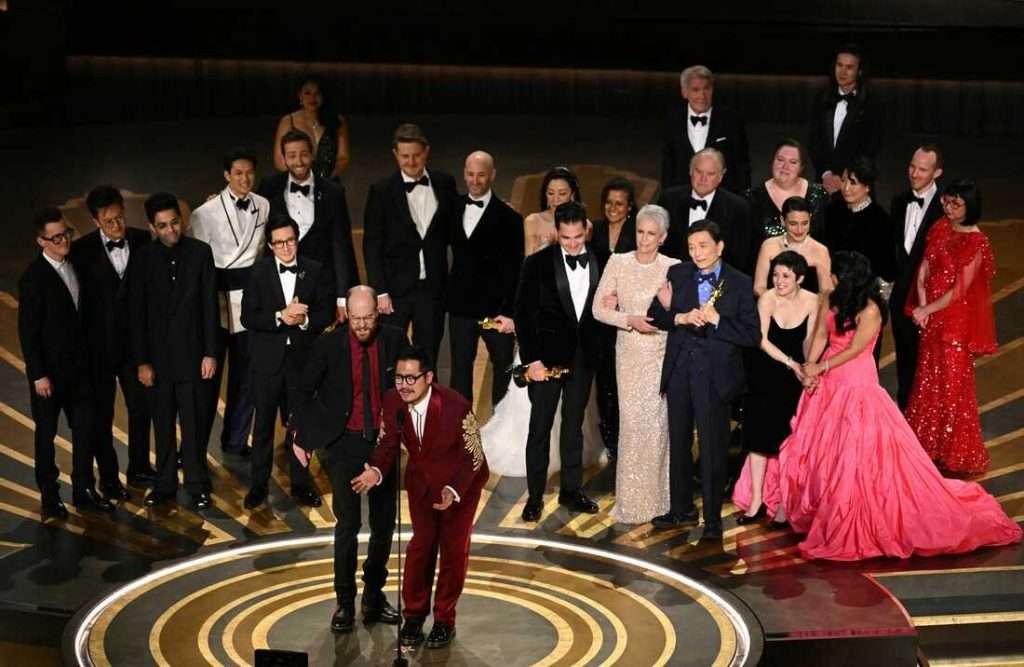
Watching last night’s Academy Awards, you never would have been able to tell that this was the same awards show in which just last year the Best Actor winner stormed the main stage to knock the lights out of the host. It was a heavy thud followed by deafening silence heard around the world, and overshadowed (and saved, some would say) an entirely boring ceremony.
In comparison, the ’23 Oscars went down without a hitch — there were no surprises or assaults, no mix-ups or blunders — and what was left was an evening that, for once, was all about the movies.
Controversy is conversation, a fact that most who tune in to these shows are well aware of. It is why the Oscar slap and the infamous Moonlight/La-La-Land debacle earned the Academy some of their highest ratings in years. Though, at the rarest and best of times, these big glamorous turnout can become all about the race. The last truly ‘great’ Oscars was anyone’s game — a Best Picture contest made up of titans of the likes of Quentin Tarantino and Martin Scorsese, indie favourites Noah Baumbach and Greta Gerwig, and a bona-fide underdog to root for in Bong Joon-ho and Parasite. In his Best Director acceptance speech, Bong used his stage-time to give flowers to his fellow nominees, bringing everyone to their feet for a blushing Scorsese.

It was the last time that the Oscar race had a buzz that felt tied to the movies rather than the scandals. Last night, while not quite able to capture the lightning-in-a-bottle feel of that 2020 ceremony, had a similar punch-your-fist-in-the-air type of energy. Everything Everywhere All At Once, which started out as the big underdog of the season quickly became frontrunner, sweeping all the major awards last night including Best Picture, Best Director, Best Actress, Best Supporting Actress and Best Supporting Actor for a doe-eyed Ke Huy Quan. The film is now the most awarded film in history, taking the mantle from Peter Jackson’s Lord of The Rings: Return of The King. Though Jamie Lee Curtis beat out four other women with far superior performances to her (Angela Bassett’s reaction says everything that we’re thinking), Brendan Fraser winning over Austin Butler proved that, in voters’ eyes, the come-back story is perhaps more palpable than the hot young rising star, and Michelle Yeoh, after a career of show stopping performances, became the first ever Asian to win Best Actress. Everything Everywhere steamrolled the competition, which, for those of us who have been rooting for its early days as the little indie flick with great word-of-mouth, is a small miracle, even if its glory took some excitement out of the competition.
The show wasn’t without moments of tension, however, as Edward Berger’s All Quiet On The Western Front creeped up behind Everything Everywhere as an unexpected threat, backed by ominous horns (that frankly didn’t feel too far off The Imperial March) and taking home Best Production Design, Best Cinematography, Best Original Score and Best International Feature. The German remake of the 1930s classic felt like the type of adversary this awards show needed, and, as one of the understated films of the season, they’re well-deserved glory keeping the competition alive.

It’s been a powerful year for films battered by COVID restrictions, but there were some snubs. Sleepy Joe must have been napping at the wheel as the huge number of Irish nominations failed to materialize beyond the Best Short-winner An Irish Goodbye. Although Martin McDonagh’s playwrighting heritage has always produced sharp scripts, it’s hard for Banshees of Inisherin to beat a film that’s so bizarrely true to the concept of an ‘original’ screenplay as Everything Everywhere. Innaritu’s Bardo—a flawed, brilliant outing and popular with Latin-American critics—was already in dark tides with its small number of nominations, as was Babylon. As for Tár (easily one of the best films of last year), Elvis and The Fabelmans, the once-frontrunners of the season fell to the wayside, leaving the Dolby theatre empty handed. That being said, all of the above nominations suggest a wider variety of styles and genre nominations that the academy has seen since…well, ever.

It was refreshing to see the Academy make a return to what made it work in the first place: glamour and good movies. While the BAFTA awards reach for the contemporary, sometimes saturating their show with generic presenters and forced musical numbers, the Oscars have taken a different route more in line with their roots, rejecting clickbait modernity in favour of a ceremony that reflects on how far movies have come and why we loved these awards shows in the first place. That we might get a film as left-field and innovative as Everything Everywhere come up against a filmmaking masterclass like Tár, thought-provoking emotional bombshells like The Whale and All Quiet, and big-budget crowdpleasers like Avatar: The Way of Water and Top Gun: Maverick is something culture gatekeepers might scoff at, but is at its core a cause to celebrate.
Overall, though, aside from a poisonous Everything Everywhere discourse currently reaching boiling point on socials (film twitter continues to breed some of the most spiteful creatures on the internet) and the Academy forgetting to include Triangle of Sadness’ Charlbi Dean among others in the annual memoriam, the 95th Academy Awards, while making continuously welcome strides for Asian representation on film, was able to return to its roots for the first time in a few years — as a ceremony that isn’t reliant on the awkward moment or scandalous headline, but rather on the films and filmmakers that captured hearts and minds over the past year.






